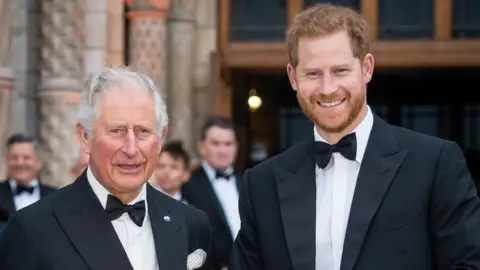King Charles tried to stop Prince Harry's hacking claim, court hears
 Getty Images
Getty ImagesKing Charles tried to stop the Duke of Sussex taking legal action against newspapers over alleged phone-hacking, court papers claim.
In a witness statement, Prince Harry said he was "summoned to Buckingham Palace" and told to drop the cases because of the effect on the family.
The duke is suing the publisher of the Sun, News Group Newspapers, over alleged unlawful information-gathering.
But NGN wants to stop his claim, saying he has run out of time to bring it.
The case is one of three major cases that Prince Harry has made against tabloid newspapers, all alleging unlawful information-gathering. The other cases concern the Daily Mirror and Daily Mail groups.
Prince Harry accuses the Sun's journalists and private investigators working for them of illegal intrusion into his personal life, dating back to when he was a teenager.
In documents revealed at the High Court on Tuesday, Prince Harry claimed that Buckingham Palace and the newspaper group had struck a backroom deal - which is why he did not bring a claim earlier. He said he first became aware of the alleged deal in around 2012.
He said that under the deal, courtiers had secretly agreed that members of the Royal Family would put off legal claims, and the newspaper group promised to one day settle out-of-court, so as to spare the Royal Family embarrassment.
"The reason for this was to avoid the situation where a member of the Royal Family would have to sit in the witness box and recount the specific details of the private and highly-sensitive voicemails that had been intercepted."
Prince Harry said courtiers were "incredibly nervous" about a repeat of the damaging disclosure of an intimate phone call between his father and Camilla, the Queen Consort, which had been intercepted and published at a time when King Charles was still married to Diana.
NGN lawyers deny there was ever a secret agreement.
According to the court documents, Prince Harry said that by 2018 he had felt "frustrated that nothing had been resolved" and wanted to "force a resolution" to the phone-hacking claims.
He said Queen Elizabeth II supported an attempt to hold the publisher to its word and agree a settlement, and she gave consent for royal staff to email the newspaper group and raise the prospect of involving lawyers.
But when he ultimately decided to sue in 2019, Prince Harry claimed his father then tried to stop him.
"I was summoned to Buckingham Palace and specifically told to drop the legal actions because they have an 'effect on all the family'," said the duke.
"This was a direct request (or rather demand) from my father, Edward Young and my father's private secretary, Clive Alderton."
Prince William 'settled privately'
Prince Harry's court papers also claim that his brother, Prince William, was paid a "very large sum" by the owners of the Sun newspaper to settle his own historical phone-hacking claims.
The payment was made in 2020 - but the documents do not disclose the amount Prince William settled for and do not have the details of what it related to.
The Prince of Wales' spokesman said he would not comment on ongoing legal proceedings.
NGN has denied that any secret agreement existed, with Anthony Hudson KC saying the prince's claim was "flatly inconsistent" with other parts of his case and there was "extreme vagueness" surrounding the circumstances of the alleged deal.
He said Prince Harry had not said who made the agreement, who it applied to, when it was made, or a date when it was meant to expire.
The Sun's owners say the prince's claim for damages should be scrapped because he had run out of time - and are applying to end his case.
If they succeed in their application it could block a similar high-profile damages claim from the actor Hugh Grant.
Lawyers for Mr Grant are also opposing the newspaper's bid to end the case over this week's three-day hearing.
At the conclusion of the hearing the judge will determine whether their claims will progress to a trial, due to be heard in January next year.
